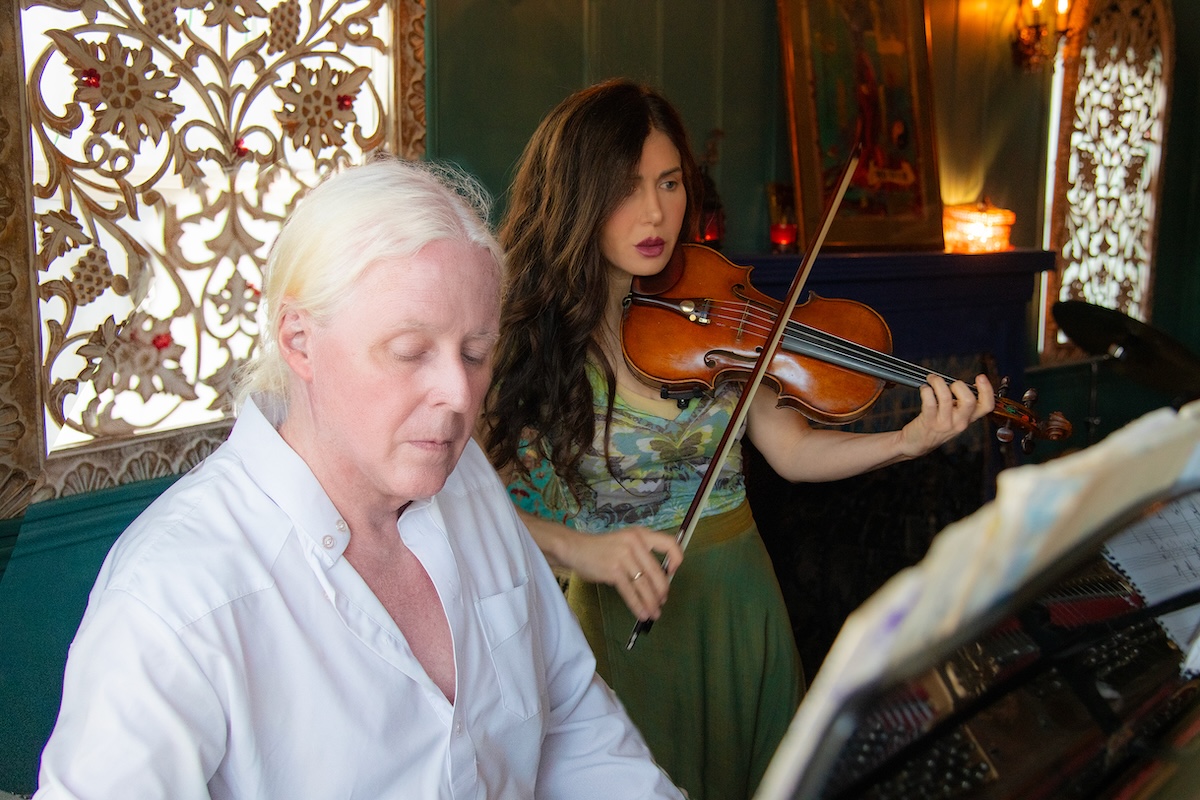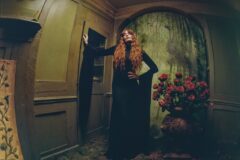About 18 months ago, violinist-composer-singer Lili Haydn sent me a kind text: our dear friend, the irrepressible singer-songwriter Angela McCluskey, had suffered a massive heart attack and was in a coma from which she likely wouldn’t wake. The next day, we lost her. My first thought was of pianist Paul Cantelon, Angela’s husband of more than 30 years.
I first met Paul at his and Angela’s 17th wedding anniversary at their Los Angeles home. I was meant to interview Angela about her album, You Could Start a Fire in an Empty House, but she invited me to the gathering beforehand—a shrewd move. The best way to understand Angela was to get swept into one of her get-togethers.
She wasn’t quite ready when I arrived. Paul greeted me in a dove-gray suit with a sharply tailored skirt that moved effortlessly with him. We didn’t know each other, but I felt instantly comfortable, like I was a regular guest at their home. Angela came down the stairs, her energy filling the room before she did. It was as if we’d always been friends.
I stayed for hours. I talked to so many people. Famous musicians and actors performed alongside complete unknowns, and it was magical. I wrote then that it was “star-studded but not glittering.” Angela had a way of “humanizing everyone.” I felt such a strong sense of belonging that, once home, I started planning to move to their neighborhood.
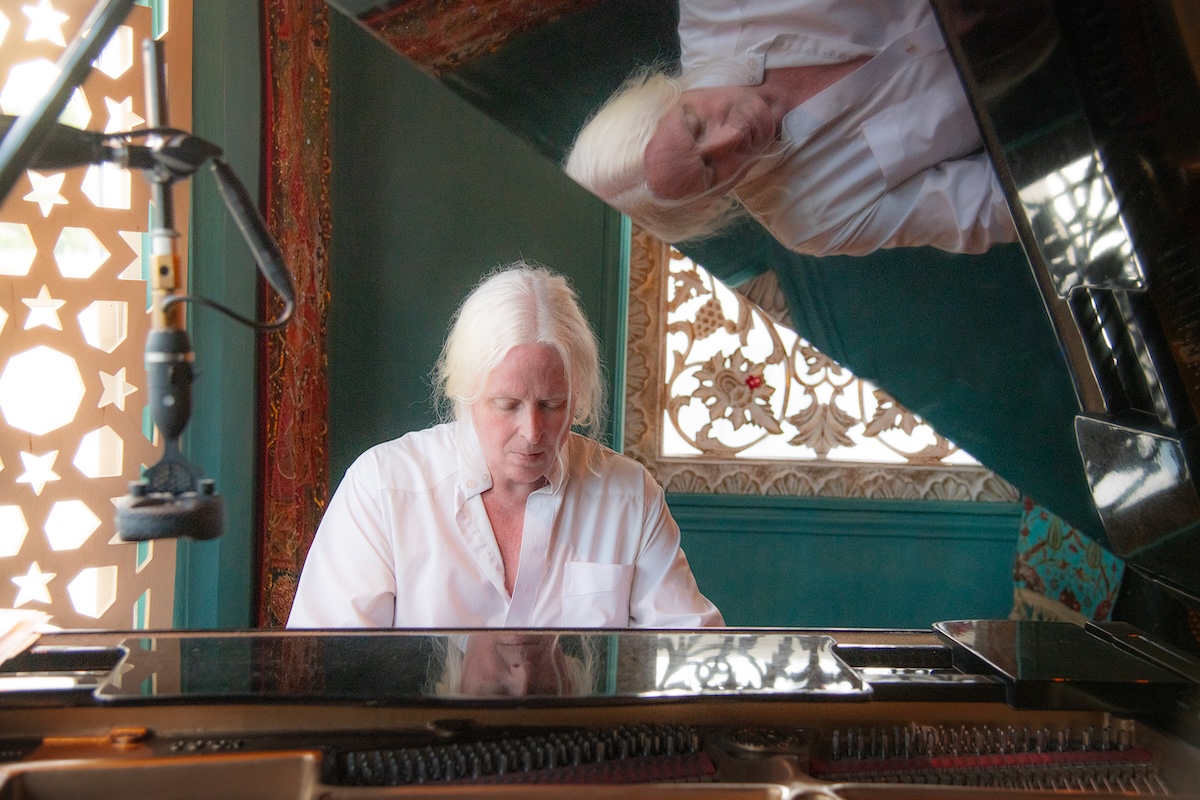
The move changed my life. Angela knew it, and she told Paul. She was a force of nature, and her death left a hole as raw now as when it happened. Since the early ’90s, she and Paul had been Los Angeles fixtures. They formed Wild Colonials, released several albums, and her inimitable voice fronted Telepopmusik’s ubiquitous global hit “Breathe.” “If I had a dollar for every time someone texted me when they heard that song, I’d be a millionaire,” she once told me. Her husky, blues-drenched voice turned up many places, including on collaborations with Kendrick Lamar, Morgan Page, and Paul Oakenfold. Paul, classically trained, composed scores for The Diving Bell and the Butterfly, The Other Boleyn Girl, and Jane Fonda in Five Acts.
In their early L.A. days, Angela and Paul met their neighbor Lotus Weinstock, a trailblazing comedian who became a close friend. Through Lotus, they also met her daughter Lili. A decade ago, Lili and I later bonded over losing our mothers in our 20s (something Angela shared, too). Where I see myself as the “death keeper,” Lili is perhaps the “death usher,” having played violin for seven people as they’ve died.
“When my mom was on her deathbed, I heard a melody in its perfect formation,” she tells me as we sit in the rich and warm environs of her living room. “I got my violin out and I played it for her as she passed. I always felt she gave me that melody to call her whenever I needed her. I have played that melody any place I’m asked to be where spirit needs to be called in and people’s energy needs to be focused.”
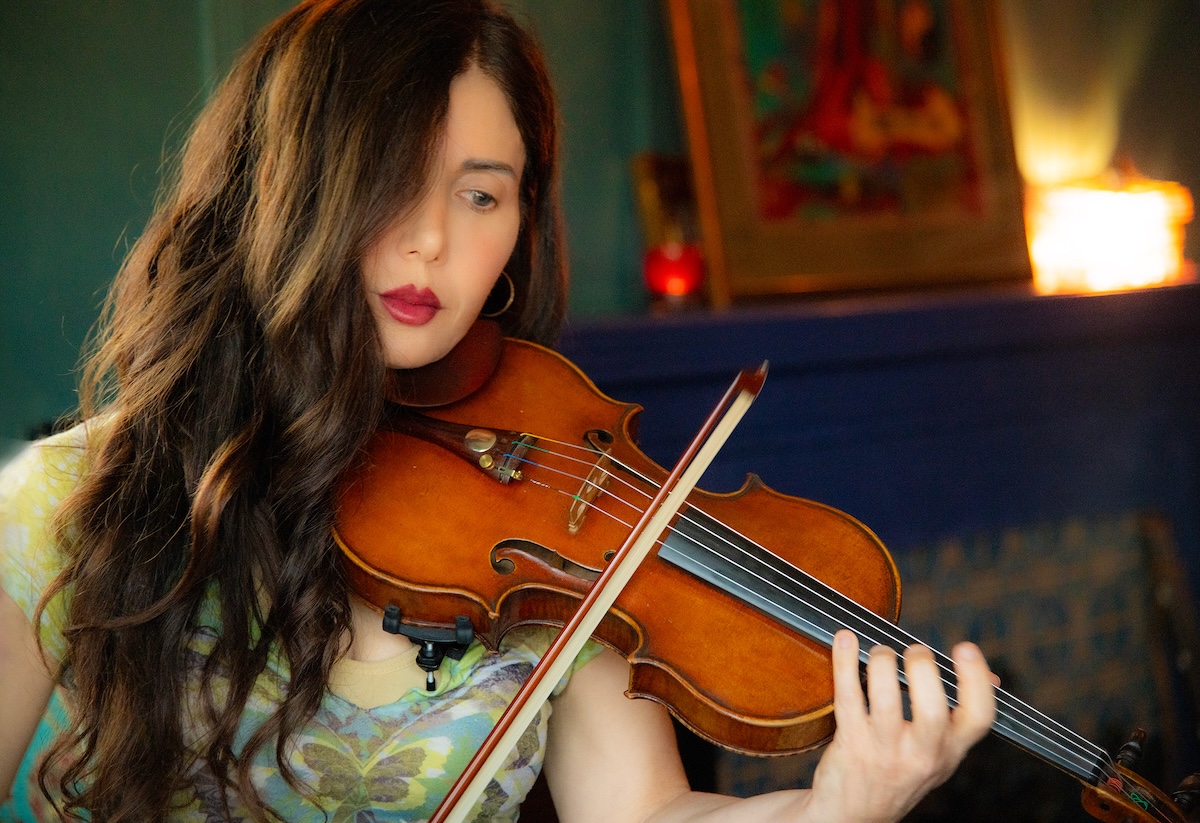

Death is not what I want to think about around Lili, who is summer personified in a straw hat and wraparound burgundy skirt that sweeps the floor, her matching lipstick setting off her navy eyes. She radiates life and spirituality. It vibrates around her and permeates her two-story home and studio which she shares with Itai Disraeli, her husband and bandmate in the Grammy-winning Opium Moon. There are instruments, books, and color everywhere. Tapestries cover the walls. Antique chandeliers give every room extra warmth. A beautiful jacket that belonged to Lotus hangs from the banister. There is an organic, personalized feel to this home that is inviting and nurturing.
Lili brought Paul here, seating him at the grand piano—something he struggled to face after Angela’s death. Music had been their connective tissue, and in this room, Lullabies for the Brokenhearted was created.
Across the country, in Brooklyn, Paul is in tonal pink, including gold-framed burgundy shades. He’s cried so much since losing Lushka, his 25-year-old soulmate cat, that his eyes are infected. This also happened when he lost Angela. But as we speak, a little rainbow begins reflecting off the window onto his lips. It feels like Angela coming through that flickering splash of color.
When she was first gone, friends filled their home with music and wine. Later, Paul scattered Angela’s ashes in the Firth of Clyde in Scotland, where she’s from, while he played his fiddle and her childhood friend sang “The Skye Boat Song.” Many “wee drams” were had. Upon his return to Los Angeles, he withdrew into their empty house, ordering too much “plunky” stuff and battling stomach issues. As he tells me this, he apologizes and says it makes him feel “squiffy” to talk about it.
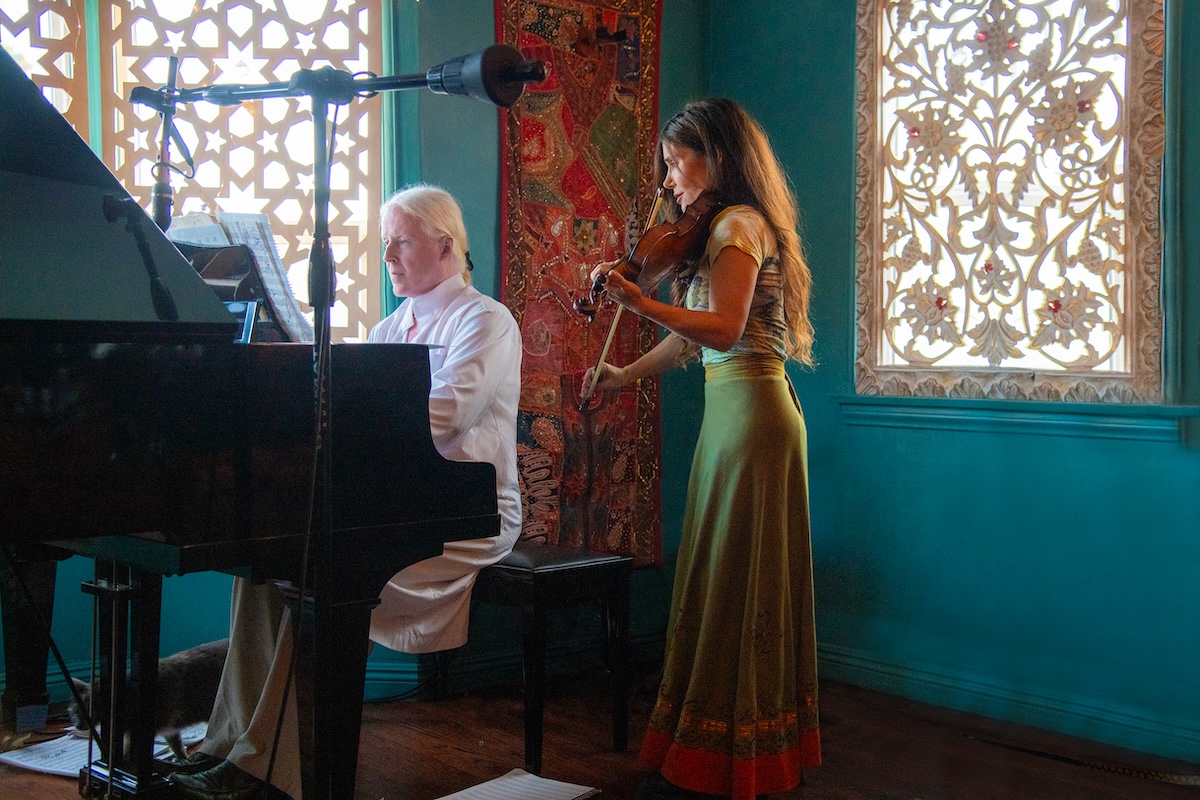

He turned to Rain Phoenix, a steady friend and someone quite capable around death. She sent him to We Care Spa. There, he entered the tent of a shaman, “a ballsy biker chick.” “She was brilliant, but there was no sage-ing and incantation,” he says. “I don’t know what happened, but I started to slip away, and I wasn’t uncomfortable. I had a lovely vision of Angela. Her arms were outstretched, and she was smiling that radiant smile of hers. I felt this wonderful warmth and love. Behind her was this—she would have loved it—bohemian ruby glass red with shards of gold through it. It was beautiful. I knew then that if I would walk in the light and try, she would be with me.”
It was only after this experience that Paul found the courage to play the piano again, specifically to create Lullabies for the Brokenhearted. Spare in instrumentation yet full of movement, its classically-rooted eight songs carry the sorrow, grief, vulnerability, and humanity of their creators. The depth of emotion is palpable. As much as these beautiful and stirring songs are born of sadness, listening to them brings connection and understanding and relief.
“I know that this album is righteous,” says Lili. “This is where my integrity resides. I know I can bring a certain level of sensitivity, kindness, warmth, love, connectivity, and expansion of consciousness to any situation like this. When you’re doing something that feels right, usually there’s an inner voice or an angel or a muse on your shoulder that says, ‘Do this.’ When Angela died and I saw Paul breaking in front of my eyes, I said, ‘Paul, it’s time for us to make an album. Let’s put our pieces together.’ He said yes, because he’s polite, and he’ll do anything for me, but I don’t think he really had any intention.”
Most of the songs existed in earlier forms. The deeply moving “The Last Serenade” is based on Lotus’ deathbed melody and a new recording of “Point No Point” is from Paul’s album of the same name which also appeared on The Diving Bell and the Butterfly. There is a cover of “Kol Nidre,” the song to wipe the slate clean for the holiest day of the year. “The Entwined” is written by Lili, and its heartwarming video is cut from priceless footage of Paul and Angela’s wedding and closes with a present-day note from him to her. The album’s opener, “The Edgeless Safety of the Sea” was written by Lili and Paul during the 10 days of Lullabies for the Brokenhearted’s recording, six months after Angela’s death.
“Rather than this being an album about death or the finality or the brokenhearted, to me, this is an expansion of consciousness,” says Lili. “It’s a place where we’re opening up the possibility that there’s more. There doesn’t have to be a separation between this world and the next, or between you and me, or between any of us. That’s what I hold in my heart. That’s been my experience as I’ve played for people in this sacred space where most people are afraid to talk about, to be present for. But If you’re not afraid, it’s one of the two most sacred experiences of any of our lives: being born and leaving, and there’s a palpably different energy in that space.”
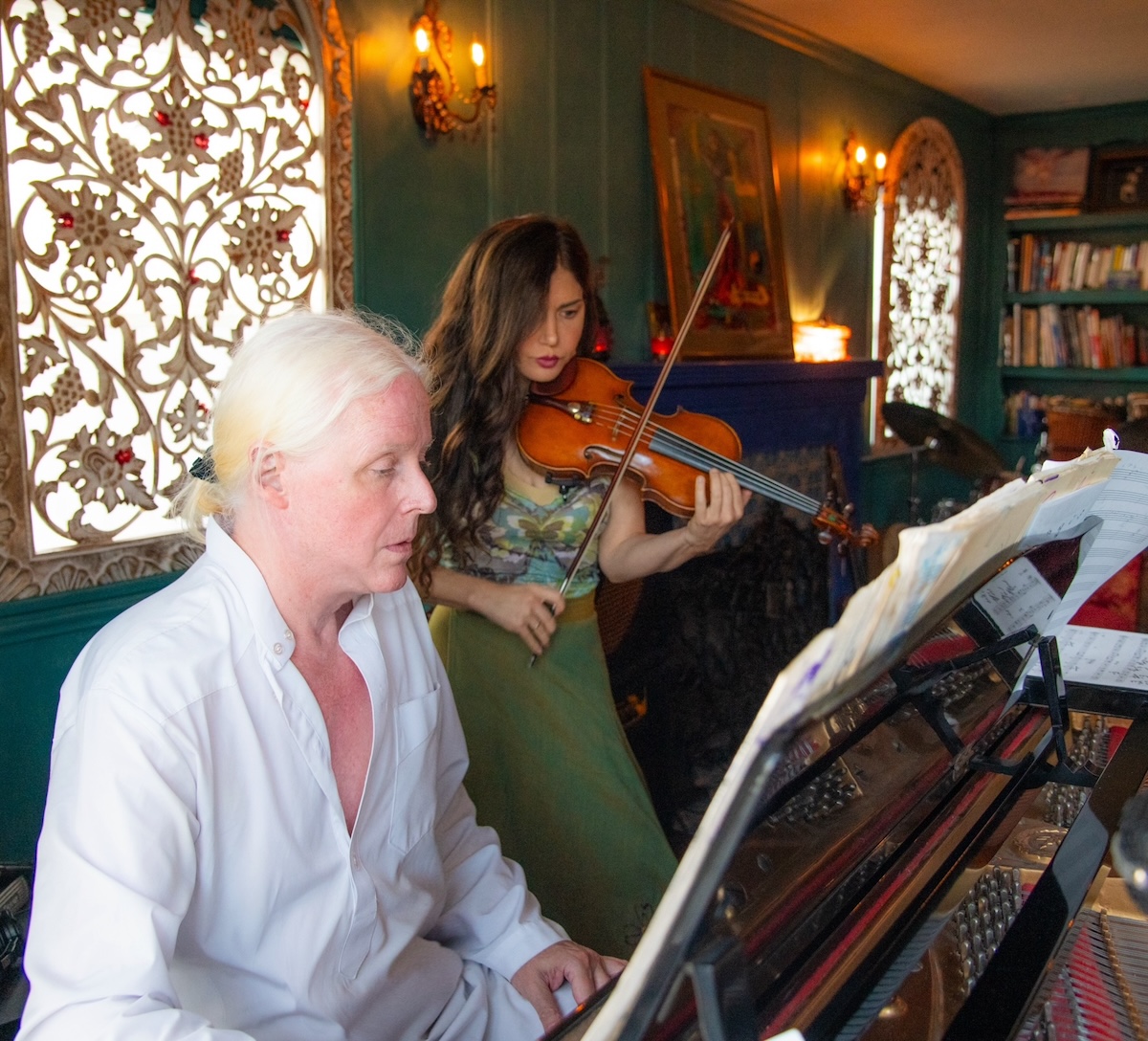

It doesn’t seem possible, but Angela is more present than ever. About a year after her death, Michael Stipe asked Paul to be part of the Tibet House Benefit Concert at Carnegie Hall. Paul has previously done arrangements of David Bowie songs for Michael, but couldn’t remember any of them.
“I’m not so fatuous as to say, ‘God, please give me a sign, because I’m scared to do this,’ but I said it,” says Paul. “Then I opened one of Lushka’s carpet bags with her catnip and toys and the only things that fell out were those arrangements. So I did the concert, and Angela was with me, and it went well.”
But soon after that, every time he sat down to play, Paul would find himself crying, which led to panic as the songs on Lullabies for the Brokenhearted are complicated and he couldn’t remember them. “But then as I played, I started to feel this comfort coming to me and it changed everything,” he says. “The very thing the album’s supposed to do, it did for me. It brought healing to me, as if I had nothing to do with it. Lili was very emotional, because it’s a miracle for me that I wanted to play it so people can find comfort in their grief and healing. It’s very recent that this happened. I can play again and I’m wildly grateful.”
When they speak about each other, Lili calls Paul her older brother and he refers to her as his kid sister. They share a Christmas birthday. She says she’s been performing with Paul and Angela her entire adult life. Paul says, “Lili’s mama used to call her a ‘celestial bulldog.’ She’s got this wild determination. She did everything herself. I’ve been as effective as a roll of wet paper towels because until the healing the music brought me, for months I’ve been either at my fire escape garden or sat with Lushka on my lap staring out at the park. You can’t stay in a reverie of melancholy. That’s not sustainable.”
“This album exists in an in-between place where separation is just an illusion,” says Lili. “There is no separation between this world and the next. None of us knows what exists beyond this life. Having lived this long with the other half of my heart not being embodied [since my mother died], I feel her presence very palpably. I know that music, wherever it comes from, is another place. When I get out of the way and I let whatever that is come through music, I go to places I couldn’t have anticipated. If you’re willing to walk in uncomfortable places with the intent to open yourself to surrender to something bigger, that something else happens.”
Lili Haydn and Paul Cantelon perform Lullabies for the Brokenhearted at Lullabies and Landscapes at Bandrika Studios in Los Angeles on August 23 and Illuminations: Music That Reflects and Radiates at the Church of Heavenly Rest in New York City on September 4.

